Childhood Education Innovations
Celebrating 100+ Years of Publication!
Subscribe and receive Childhood Education Innovations magazine, bringing you cutting-edge innovations in children’s education from around the world.
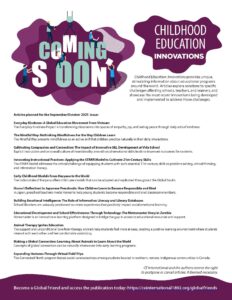
Childhood Education: Innovations is an education magazine that provides unique, stimulating information about educational programs around the world. Articles explore solutions to specific challenges affecting schools, teachers, and learners and showcase the most recent innovations being developed and implemented to address those challenges. Readers will find inspiration for transforming education to better serve children and society. Published 6 times a year, CE Innovations provides a window into the work being done to bring quality, equitable education to all children. It stands alongside the Journal of Research in Childhood Education as one of our signature publications.
CONTENTS
July/August 2025
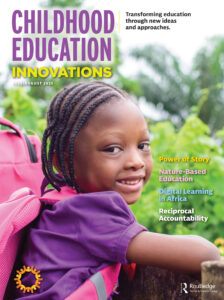
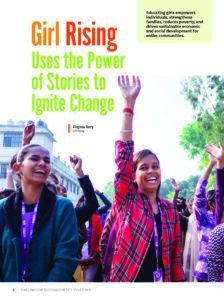 “Girl Rising Uses the Power of Stories to Ignite Change”
“Girl Rising Uses the Power of Stories to Ignite Change”
Despite significant strides in girls’ education over the past two decades, millions of girls, particularly those in marginalized and rural communities, still face systemic barriers limiting their potential. Social norms, biases, limited resources, and societal expectations hinder their opportunities, and global crises like climate change, conflict, and technological shifts only exacerbate these challenges. To address these issues, Girl Rising’s RISE program focuses on empowering girls through a locally tailored, community-driven approach, collaborating with grassroots organizations and adapting to local curricula. RISE not only fosters self-confidence, critical thinking, and leadership in girls, but also provides tools for teachers, support for parents, and engages community leaders to create a sustainable, gender-equitable education system. This holistic approach ensures lasting impact by building a supportive network around the students.
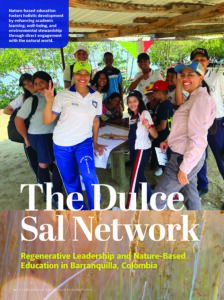
“The Dulce Sal Network: Regenerative Leadership and Nature-Based Education in Barranquilla, Colombia”
In 2022, an interdisciplinary team launched the Dulce Sal Schools Network in Colombia’s Atlántico region, building on the work of OpEPA and the Red de Colegios Cerros de Bogotá. This collaborative, nature-based educational network unites over 50 teachers and 25 institutions, aiming to not only enhance cognitive abilities, but also foster deep connections between individuals, their environment, and themselves. Through regenerative leadership and nature-based education, teachers have developed a sense of purpose, recognizing their collective power to lead and inspire change in their communities. This relational approach to nature-based education (NbE) emphasizes experiential learning and the integration of nature as a central element in the educational process. By encouraging kinesthetic, inquiry-based, and play-based learning, NbE has proven to improve academic performance, promote physical and emotional well-being, and foster inclusion. As a model emerging in Latin America, NbE has become a key strategy for both educational transformation and the advancement of planetary health.
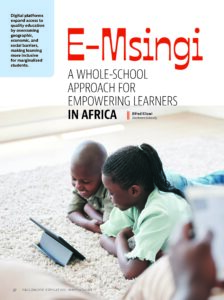
“E-Msingi: A Whole-School Approach for Empowering Learners in Africa”
E-Msingi, an educational initiative developed by Strathmore University’s Community Service Centre in Kenya, aims to build a strong educational foundation through digital platforms, focusing on a whole-school approach. It rests on five key pillars: student-subject content, teacher engagement, parental involvement, psychosocial support, and life skills education. E-Msingi provides students with STEM challenges and eLearning opportunities, supports teachers with digital literacy and education management training, and engages parents with customized content through podcasts and case studies. The initiative also offers psychosocial support for addressing mental health and emotional challenges in schools and trains teachers in life skills and community service learning. By focusing on these integrated pillars, E-Msingi strives to create a collaborative and inclusive educational environment, reaching over 500 teachers and 5,000 parents, with plans to expand across Africa.

“Shifting Power in Accountability Systems: A Look at Reciprocal Accountability Structures Across the Globe”
Reciprocal accountability in education emphasizes mutual responsibility among local educators, families, learners, and the broader community, aiming to create true learning communities rather than disconnected school systems. This approach involves shared ownership, where not only schools are accountable for meeting educational goals, but districts, states, and the surrounding community also play vital roles in providing resources and support. It fosters a transparent, real-time system where communities work together to innovate and define holistic measures of school quality based on local values and needs, rather than relying on one-size-fits-all, compliance-based measures. The system encourages deep engagement with local stakeholders, integrating outcomes like student wellness, educator retention, and school climate into accountability metrics, while also shifting power to communities to design their own education systems. Ultimately, reciprocal accountability leads to a culture of agency, empowering all stakeholders to work collectively for continuous improvement and more meaningful learning experiences for students.
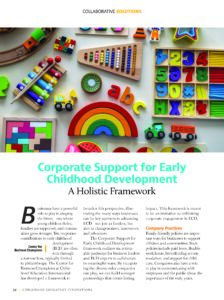
“Corporate Support for Early Childhood Development: A Holistic Framework”
Businesses have a powerful role to play in shaping the future—one where young children thrive, families are supported, and communities grow stronger. Yet, corporate contributions to early childhood development (ECD) are often seen through a narrow lens, typically limited to philanthropy. The Center for Business Champions at Childhood Education International has developed a framework to broaden this perspective, illustrating the many ways businesses can be key partners in advancing ECD—not just as funders, but also as changemakers, innovators, and advocates. The Corporate Support for Early Childhood Development framework outlines six actionable pathways for business leaders and ECD experts to collaborate in meaningful ways. By recognizing the diverse roles companies can play, we can build stronger partnerships that create lasting impact. This framework is meant to be an invitation to rethinking corporate engagement in ECD.
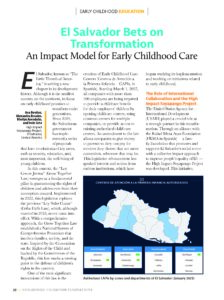
“El Salvador Bets on Transformation: An Impact Model for Early Childhood Care”
El Salvador is making significant strides in early childhood development, aiming to transform future generations. The “Ley Crecer Juntos” (Grow Together Law), implemented in 2022, is central to this transformation. It establishes a National System of Comprehensive Protection for children and ensures children’s rights from conception onward. A key innovation of the law is the creation of Early Childhood Care Centers (CAPIs), which require companies with over 100 employees to provide childcare benefits, either through in-house centers, shared facilities, or financial support for parents to access care. This progressive legislation, inspired by international conventions and the Constitution, has spurred widespread interest from institutions, leading to ongoing studies and initiatives focused on early childhood education and care. As of January 2025, El Salvador has 31 certified CAPIs, mostly located in the San Salvador department. These centers have an average capacity of 60 children each, directly benefiting more than 1,860 children and indirectly impacting over 5,580 people. This joint effort between the government, the private sector, and educational institutions reflects the country’s commitment to comprehensive early childhood development.
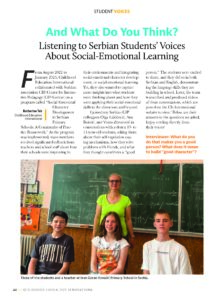
“And What Do You Think? Listening to Serbian Students’ Voices About Social-Emotional Learning”
From August 2022 to January 2025, Childhood Education International collaborated with Serbian association CIP-Center for Interactive Pedagogy (CIP-Centar) on a program called “Social-Emotional Character Development in Serbian Primary Schools: A Community of Practice Framework.” As the program was implemented, team members received significant feedback from teachers and school staff about how their schools were improving in their environments and integrating social-emotional character development, or social-emotional learning. Yet, they also wanted to capture more insights into what students were thinking about and how they were applying their social-emotional skills in the classroom and beyond. In conversations with a dozen 13- to 14-year-old students, the young people were asked about their self-regulation coping mechanisms, how they solve problems with friends, and what they thought constitutes a “good person.” The students were excited to share, and they did so in both Serbian and English, demonstrating the language skills they are building in school. Later, the team transcribed and produced videos of these conversations. This article presents their answers.
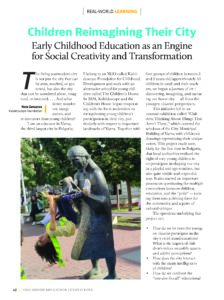
“Children Reimagining Their City: Early Childhood Education as an Engine for Social Creativity and Transformation”
In 2024, the Kaleidoscope Foundation and the Children’s House partnered with local authorities in Varna, Bulgaria, to amplify young children’s participation in their city, focusing on key landmarks and spaces. Four groups of children age 2 to 6, along with their teachers, embarked on a journey to rediscover and reimagine their home city from their unique perspectives. This effort culminated in the exhibition “Children Thinking About Things That Aren’t There,” where children’s drawings were displayed on the windows of the City Municipal Building, marking a significant moment in Bulgaria by asserting young children’s right to co-create and influence their city in an age-appropriate and visible way. The project raised crucial questions about integrating children’s voices in urban development, challenging the conventional “one-size-fits-all” educational approach, and rethinking how cities engage with the diverse intelligences of children, emphasizing the importance of qualitative, child-centered development in both education and community spaces.

“Discovery Boxes: Cultivating SEL and Historical Literacy in K-2 Classrooms”
Discovery boxes offer an innovative approach to revitalizing social studies in early elementary education by addressing the dual needs of building historical knowledge and fostering critical social-emotional competencies. In the face of policy shifts that have marginalized social studies in favor of subjects like reading and math, discovery boxes provide a hands-on, inquiry-based experience that integrates social studies with English language arts. This interdisciplinary method enriches both cognitive and social-emotional learning by helping students develop historical thinking skills, empathy, self-awareness, and collaboration through the exploration of diverse perspectives and primary sources. Rather than focusing solely on academic performance, discovery boxes empower students to connect emotionally with history, cultivate resilience, and nurture their identities as compassionate learners and active citizens, preparing them to become thoughtful leaders in an interconnected world.
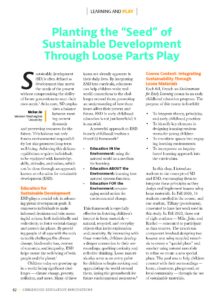
“Planting the “Seed” of Sustainable Development Through Loose Parts Play”
Education for Sustainable Development (ESD) is essential in advancing global development goals by empowering individuals to make informed decisions and take meaningful actions to address challenges like climate change, biodiversity loss, and inequality. For children growing up in a world affected by these issues, ESD in early childhood education plays a vital role in connecting them to real-world problems and promoting understanding of their current and future impact. A threefold approach to ESD involves: learning in the environment through direct engagement with nature, learning about the environment by understanding natural systems, and learning for the environment through encouraging social action for change. This approach helps children develop a deeper connection to their surroundings, fostering curiosity and environmental awareness through interactions with loose materials like natural, recycled, and everyday objects.

“Whose Play Is More Valuable? A Commentary on Sharing”
The author suggests that instead of focusing on forced turn-taking or timers, early childhood education should prioritize respecting each child’s autonomy and allowing them to engage in play on their own terms, even if that means a child plays with a toy for an extended period. While empowering children to ask for toys is important, educators must also be ready to support them when they hear “No,” by encouraging patience and offering alternative activities. The Reggio Emilia approach suggests that the classroom environment should meet children’s needs, allowing for more flexible play opportunities, like adding extra materials or extending activities. True kindness, as taught through the concept of “filling someone’s bucket,” involves respectful actions, not forcing a child to give up a toy crucial to their learning. Teaching children to protect their own play and happiness, much like the concept of a “lid” for their emotional well-being, helps them understand self-respect and empathy, ultimately empowering them to value both themselves and others.
